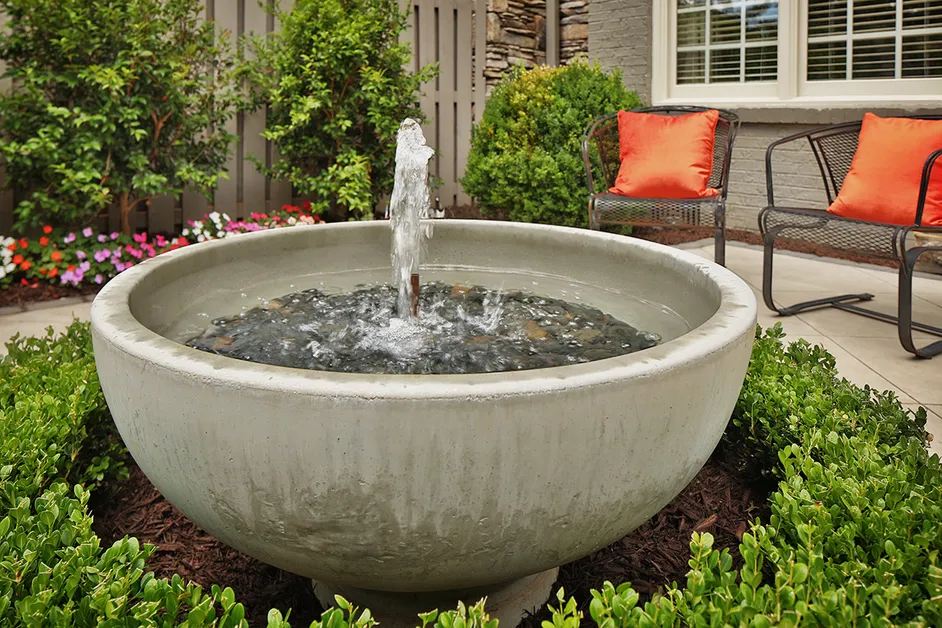Water Fountain for Home Vastu - Expert Picks (2025)

Water Fountains in Vastu are considered a crucial decorative element believed to enhance positive energy. According to Vastu Shastra, incorporating a water fountain in your home or office is thought to attract prosperity, luck, and fortune by creating a harmonious and positive environment.
This comprehensive guide uncovers the intricate relationship between water fountains and Vastu, offering insights into their placement within homes. Look into the significance, advantages, and precise guidelines for optimal placement in this thorough exploration of incorporating water fountains in your home to harness positive vibes and potential fortune.
What is the Vastu for a Water Fountain for Home?
Following Vastu principles, placing a water fountain in the north or northeast direction of your home is recommended, as these are considered auspicious for water elements and positive energy. The flowing water in the fountain symbolises wealth and positivity, aligning with Vastu's beliefs.
Moreover, Vastu suggests that indoor water fountains are considered auspicious, bringing beauty and elegance to your living space. The direction of water flow is significant: northward flow is associated with family happiness, while eastward flow is linked to financial gains. Thus, positioning wastewater outlets and main drainage towards the east or north is advised.
If Vastu guidelines pose challenges in finding an ideal location for the indoor fountain, an alternative is to install a metal water feature in the room's northwest corner. This offers flexibility while adhering to Vastu principles for a wholesome living environment.
Significance of a Water Fountain for Home in Vastu
In Vastu Shastra, a water fountain holds significance as it symbolises positive energy, prosperity, and joy. Believed to attract luck, the flowing water is thought to enhance the overall well-being of the occupants, fostering a positive environment within and around the home. Placing the fountain strategically in the north or northeast sectors is considered auspicious, aligning with Vastu principles associated with wealth and positive energy.
Beyond its aesthetic appeal, installing a water fountain is considered beneficial for infusing spaces with happiness and tranquillity. The soothing sound of flowing water creates a composed atmosphere, contributing to calmness inside and outside the residential area, making it a favourable addition for Vastu-conscious individuals.
Furthermore, a water fountain contributes to balancing the five elements (Pancha Bhoota) in Vastu, where water represents the element of 'Jal' (water). This balance enhances the overall energy of the space, fostering a sense of well-being and positivity.
Keeping the fountain in good working condition is advisable to maintain positive energy dynamics, ensuring a steady flow of water, as any malfunction or stagnation may have adverse effects, according to Vastu beliefs.
Types of Water Fountain for Home as per Vastu
Metal, Stainless Steel or Copper Water Fountain
The use of metal-based materials like stainless steel or copper in water fountains is believed to attract wealth and prosperity according to Vastu principles. These materials are associated with strength and durability, symbolising a solid foundation for financial well-being. The flowing water in these fountains is thought to enhance positive energy, fostering a conducive environment for abundance.
Stone or Ceramic Water Fountain
Stone or ceramic water fountains are known for their grounding energy. The use of natural materials like stone connects with the Earth's elements, promoting stability and balance within space. These fountains create a calming atmosphere, making them suitable for areas where a sense of tranquillity is desired, such as meditation spaces or bedrooms.
Tabletop Water Fountain
Tabletop water fountains, regardless of the material, are well-suited for smaller spaces. According to Vastu, these fountains promote harmony and tranquillity, making them ideal for placement in areas where you engage in activities requiring focus and concentration, such as study or workspaces.
Hanging Water Fountain
Hanging water fountains, crafted from various materials, are believed to enhance positive energy and improve energy flow within a space. By introducing a vertical element, these fountains contribute to a harmonious energy flow, making them a recommended choice for areas where the energy needs revitalisation.
Tall Water Fountain
Tall water fountains symbolise growth and positive energy. According to Vastu principles, these fountains are recommended for open spaces that can stand as a focal point, radiating a sense of upward movement and prosperity throughout the environment.
Japanese Water Fountain
Incorporating bamboo, stone, or ceramic elements adheres to Vastu principles by promoting harmony with nature. These fountains are designed to bring peace and balance to a space, emphasising the significance of establishing a connection with the natural world.
Tiered Water Fountain
Tiered water fountains represent upward movement, mirroring the cascading flow of water. Vastu suggests that these fountains enhance positive vibrations, making them suitable for areas where an uplifting and energising ambience is desired.
Cascading Water Fountain
Cascading water fountains promote the continuous flow of energy, which is associated with prosperity in Vastu. The cascading effect invites positive forces into the environment, contributing to overall well-being and abundance.
Wall Water Fountain
Utilising vertical space not only enhances the aesthetic appeal but also improves the energy flow in a room. Following Vastu principles, these fountains can be strategically placed to balance the elements within a space and foster a harmonious atmosphere.
Places to Keep Water Fountains at Home as per Vastu
According to Vastu principles, the placement of a water fountain can influence the flow of positive energy or "prana" within your home. Let's look into various Vastu tips related to different areas of the house where water fountains are commonly placed.
Indoor Water Fountain
A water fountain indoors symbolises prosperity and positive energy. According to Vastu, placing a fountain in the north or northeast direction is considered auspicious, as it aligns with positive energy flow. Ensure the fountain is well-maintained, with clean water and a smoothly running pump, to symbolise the continuous flow of positive vibes.
Outdoor Water Fountain
Outdoor water fountains contribute to your property's overall energy. According to Vastu, placing them in the north or east direction is considered favourable. Ensure the water flows toward the house, symbolising the influx of positive energy. Avoid placing outdoor fountains in the south or southwest directions, as they may disrupt the natural balance.
Water Fountain in Living Room
The living room serves as the heart of the home, making its Vastu considerations crucial. Position the water fountain in the north or east area to enhance positive energy. However, avoid placing it in the southwest corner, as this may impact financial stability and create imbalances in the family dynamics, according to Vastu principles.
Water Fountain in Bedroom
Opt for smaller water features in the bedroom, as it's a space associated with rest. Place them in the northeast corner to promote tranquillity and a positive atmosphere for sleep. Large water fountains are generally discouraged in bedrooms, as they may disrupt the serene ambience.
Water Fountain at Front Door
Placing a water fountain near the front door is believed to invite positive energy into your home. According to Vastu, the right side of the entrance is considered auspicious for water features. Avoid placing it directly before the main entrance, as this may obstruct the natural flow of positive energy entering your home.
Water Fountain for Home: Ideal Vastu Directions
In Vastu Shastra, the arrangement and orientation of elements within a home play a crucial role in promoting positive energy flow. Here are the ideal directions for placing a water fountain at home:
East Direction
In Vastu, the east direction is associated with the rising sun, signifying new beginnings and positivity. Placing a water fountain in the east not only captures the auspicious morning sunlight but also aligns with the flow of positive energy, promoting a sense of rejuvenation and vitality within the living space.
North Direction
The north direction is considered auspicious in Vastu as it is associated with wealth and prosperity. Introducing a water fountain in the north aligns with the principles of attracting abundance. The flowing water symbolises a continuous flow of positive energy and wealth into the home, fostering a harmonious environment.
Northeast Direction
The northeast direction is considered the most spiritually charged and is associated with the element of water. Placing a water fountain in this direction is believed to enhance the spiritual vibrations within the home. The gentle sound of flowing water in the northeast can create a serene ambience conducive to meditation and spiritual practices.
Water Fountain for Home: Vastu Directions to Avoid
Here's a brief overview of directions to avoid when considering a water fountain for home, as per Vastu Shastra:
West Direction
Placing a water fountain in the west is discouraged in Vastu as it is believed to disrupt the natural flow of energy related to finances. The west is associated with the setting sun and represents a decline in energy, making it unsuitable for a water feature that symbolises constant flow and abundance. This placement may lead to financial instability and hinder overall prosperity.
South Direction
Avoid locating a water fountain in the south since it's associated with the element of fire. Water and fire energies are considered opposing forces, and placing a water feature in this direction may lead to relationship conflicts and hinder social recognition. It is believed to hurt fame, recognition, and overall social relationships.
Southeast Direction
The southeast direction in Vastu is closely linked to the fire element and represents the Agni (fire). Placing a water fountain here is believed to create a clash of energies – water against fire – potentially negatively affecting wealth and business prospects. This clash may disrupt the harmony of elements and result in financial challenges.
Benefits of Water Fountain for Home as per Vastu
Integrating a water fountain into your home can bring several benefits, aligning with the principles of Vastu. Here are some key advantages:
Increases Life Quality
Vastu emphasises the importance of positive energy flow for a prosperous life. A well-positioned water fountain is believed to encourage positive energy flow and enhance quality of life. Water is considered a symbol of wealth and abundance in Vastu. Incorporating a fountain can symbolically attract prosperity and abundance into your living space.
Improves Air Quality
Beyond beauty, water fountains can act as natural air purifiers by attracting and trapping dust particles. This improves air quality and aligns with the Vastu principle of maintaining a clean and pure living environment.
Calming Atmosphere
Vastu suggests that the sound of flowing water has a calming effect on the mind, helping to alleviate stress and anxiety. Placing a water fountain in areas designated for relaxation, like bedrooms or meditation spaces, amplifies the calming ambience. The visual appeal of a water fountain adds to the overall aesthetics, creating a visually pleasing environment that aligns with Vastu's principles of balanced and harmonious living.
Acts as a Humidifier
Vastu recommends maintaining balanced humidity levels for improved health and comfort. A water fountain acts as a natural humidifier, releasing moisture into the air, especially beneficial in dry climates. Adequate humidity is associated with various health benefits, including respiratory comfort and skin hydration.
Water Fountain Placement for Home Vastu: Do's and Don'ts
Do's
- Place the water fountain near the entrance of your house, as this placement is assumed to be favourable as per Vastu and keeps the bad energy away.
- Place water fountains in your home's north or northeast directions for positive energy flow.
- Opt for indoor water fountains in the living room or northeast corner to enhance prosperity.
- Position the fountain so that the water flows towards the inside of the home, symbolising wealth coming in.
- Place the fountain in a well-lit area to enhance the positive energy it generates.
- When placed in the garden, the water fountain should be in the northeast or east orientation of the garden.
Don'ts
- Avoid placing a water fountain in the bedroom, as per Vastu principles.
- Don't position the fountain directly at the entrance, as it may block positive energy flow.
- Avoid placing the water feature in your home's southeast or southwest corner, as it is considered inauspicious.
- Do not install a fountain in the centre of the house, as it may create instability.
- Don't place a fountain under a staircase, which may lead to conflicts and health issues.
- Do not position the fountain under a beam, as it may create stress and tension in the household.
- Avoid installing a water fountain in the kitchen, as it may lead to financial drain and health issues.
- Don't place the water feature in a cluttered or untidy area, as it may obstruct positive energy flow.
Water Fountain Maintenance for Home Vastu: Do's and Don'ts
Do's
- Ensure the water in the fountain has a continuous flow to promote progress.
- Clean the water fountain regularly to prevent the accumulation of dirt, grime, and algae, which can attract mosquitoes.
- Add a small amount of hydrogen peroxide to the water to inhibit algae growth and other germs.
- Place the fountain away from direct sunlight to maintain its condition and prevent water evaporation.
- If the water flow is directional, ensure it flows towards the house, indicating wealth and prosperity.
- Utilise water fountains in home gardens, aligning with Vastu principles.
- Ensure that the water flowing from the cascading fountain is directed towards the home.
Don'ts
- Don't use harsh cleaners, as they can damage the water fountain's surface.
- Do not exceed the water levels, as it may cause spilling, excessive noise and exert pressure on the pump.
- Don't forget to regularly change the water as it can contain some debris and dirt.
- Avoid keeping a broken water fountain, as it can cause trouble for your growth.
- Don't forget to clean the water fountain pump after cleaning the surface.
- Avoid frequent switching on and off the water fountain, this may exert extra pressure on the pump.
- Avoid using tap water instead of distilled water. This may lead to corrosive spotting in the water fountain.
Tips for Buying a Water Fountain for Home as per Vastu
- Placement: Install the water fountain in your home's northeast or north direction for positive energy flow.
- Material: Choose a fountain made of natural materials like stone or ceramic for grounding and stability.
- Flow Direction: Ensure that the water flows towards the centre of the house, symbolising prosperity entering your home.
- Size Matters: Choose a size that complements the space, not too large to overwhelm or too small to go unnoticed.
- Cleanliness: Keep the fountain clean to promote good energy; stagnant water can attract negative vibes.
- Number of Tiers: According to Vastu, a three-tiered fountain is considered auspicious and promotes growth and harmony.
- Soft Sounds: Choose a fountain that produces gentle, soothing sounds to create a peaceful atmosphere.
- Lighting: Consider adding subtle lighting to enhance the positive energy emitted by the fountain.
- Maintenance: Regularly maintain and repair any leaks or malfunctions to sustain the positive energy flow.
- Symbolic Fountain Placement: If you are buying a Ganesh water fountain or Buddha water fountain for home, as per Vastu, do not keep it on the floor directly, Instead, place it on a small table above eye level.
Conclusion
This comprehensive guide sheds light on the significance of water fountains in homes according to Vastu principles. Incorporating a water fountain in your living space enhances the beauty appeal and invites positive energy and balance into your home.
What is the Vastu for a water fountain for home?
According to Vastu, a water fountain in your home can profoundly impact the energy flow within. It is advised to consider the type and placement of the fountain to ensure harmony and positive vibrations. The north and northeast are most auspicious for water fountain placement in the home.
Significance of the water fountain in Vastu for home:
The continuous flow of water symbolises the constant flow of positive energy. Placing a water fountain inside the home, strategically aligned with Vastu principles, enhances the overall well-being of the inhabitants.
Types of water fountains for home as per Vastu:
Choosing a water fountain involves considering the energy it brings into the space according to Vastu principles. Metal fountains signify strength, while stone or ceramic ones radiate grounding energy. Tabletop fountains enhance focus, hanging fountains bring lightness, tall fountains symbolise growth, Japanese fountains bring tranquillity, tiered fountains represent abundance, cascading fountains create a soothing ambience, and wall fountains contribute to balance when placed thoughtfully.
Places to keep water fountains at home as per Vastu:
Indoor water fountains are best placed in the north or northeast for prosperity, while outdoor fountains enhance energy when positioned in the north or east. For living rooms, opt for the north or east, avoiding the southwest. In bedrooms, choose smaller fountains in the northeast for a tranquil atmosphere. Front door fountains are auspicious on the right side to avoid direct obstruction to the entrance.
Vastu tips for water fountains for home:
Positioning indoor water fountains as per Vastu guidelines is believed to enhance positive energy. Placing one strategically in the living room promotes social harmony, near the front door attracts prosperity, and in the bedroom, it aims to bring peace and improve sleep quality.
Ideal directions for a water fountain in the home
- East: Promotes health and overall well-being.
- North: Attracts wealth and prosperity.
- Northeast: Enhances positive vibrations and balance.
Directions to avoid a water fountain in the home
- West: Disrupts natural energy flow.
- South: Adversely affects financial stability.
- Southeast: Leads to negative financial implications.
Benefits of water fountain for home as per Vastu:
- Increases life quality
- Improves air quality
- Creates a calming atmosphere
- Acts as a natural humidifier
Water fountain placement for home Vastu: Do's and Don'ts:
Do's:
- Ensure that the water flows toward the centre of the house.
- Surround the fountain with indoor plants for added positivity and a connection with nature.
Don'ts:
- Avoid broken or non-functional fountains, as they may have negative effects.
- Avoid using dirty or stagnant water in the fountain.
Water fountain maintenance for home Vastu: Do's and Don'ts:
Do ensure continuous water flow for progress, clean regularly to prevent dirt, use hydrogen peroxide to inhibit algae, keep away from direct sunlight, and ensure directional flow towards the house for wealth. Don't use harsh cleaners, or tap water, and exceed the water level.
Tips for buying a water fountain for your home as per Vastu:
- Choose a fountain material based on its Vastu implications, such as metal, stone, or ceramic.
- Consider the size and style that aligns with your home's Vastu requirements.
- Select a fountain that complements the overall decor and theme of your living space.
FAQ's
The ideal direction for a water fountain in Vastu is the north or northeast, which is believed to be auspicious and attract positive energy. Placing a water fountain in these areas enhances the flow of positive cosmic energy and contributes to overall prosperity and well-being in the household.
Yes, a water fountain is considered beneficial for homes according to Vastu principles. Placing it in the north or northeast direction is believed to attract positive energy and prosperity and create a harmonious environment within the home.
The significance of a water fountain in Vastu for a home lies in its ability to bring positive energy, promote financial growth, and create a harmonious environment. Water symbolises abundance and prosperity in Vastu, and a well-placed fountain is believed to amplify these positive vibrations.
The Vastu Shastra tips for a water fountain include placing it in the north or northeast direction. Additionally, ensure that the water flows towards the centre of the house, promoting the circulation of positive energy throughout the home.
According to Vastu, the best place to put a water fountain in the home is in the north or northeast direction. This specific placement is believed to align with the natural flow of energy and cosmic forces, attracting positive influences into the household.
Metal fountains, stone or ceramic fountains, tabletop fountains, hanging fountains, tall fountains, Japanese fountains, tiered fountains, cascading fountains, and wall fountains are the different types of water fountains in Vastu for the home. Choose the one that suits your house Vastu, for optimal results.
It is advisable to avoid placing water fountains in the southeast direction, as it is considered inauspicious in Vastu. This area is associated with Agni (fire), and placing a water element there may disrupt financial stability and overall well-being.
Positioning water fountains in the east direction aligns with Vastu principles and is regarded as one of the most auspicious choices. This direction is believed to be associated with positive energy and vitality. Placing a water fountain in the east can enhance the flow of positive vibrations, promoting a harmonious atmosphere in the home.
Avoid placing water fountains in the south direction according to Vastu principles, as it may disturb the balance of energy in the house. The south is associated with the element of fire, and introducing water in this area might create conflicting energies.
The benefits of water fountains in Vastu for a home include enhanced positive energy, improved financial prospects, and a calming atmosphere. The sound of flowing water is believed to bring tranquillity and balance to the living space, contributing to overall well-being.
For Vastu compliance with a home water fountain, make sure to maintain cleanliness, ensure proper water circulation, and promptly fix any leaks. Consistent upkeep ensures that the fountain's positive energy remains strong, fostering a harmonious environment.
When buying a water fountain for your home in adherence to Vastu principles, consider factors such as size, material, and design. Ensure the fountain's size is proportionate to the space, choose materials that align with Vastu guidelines, and select a design that complements the overall aesthetics of your home.









